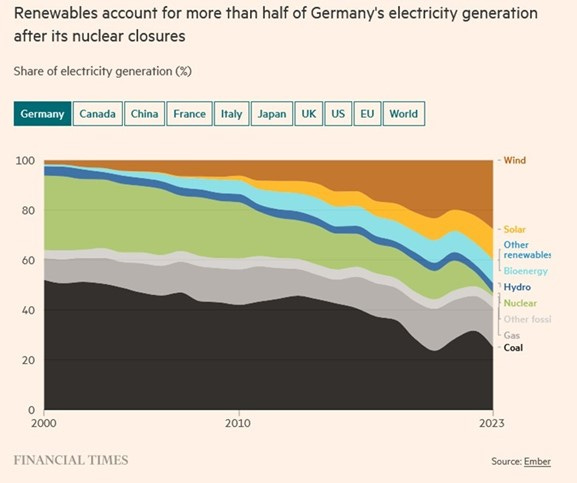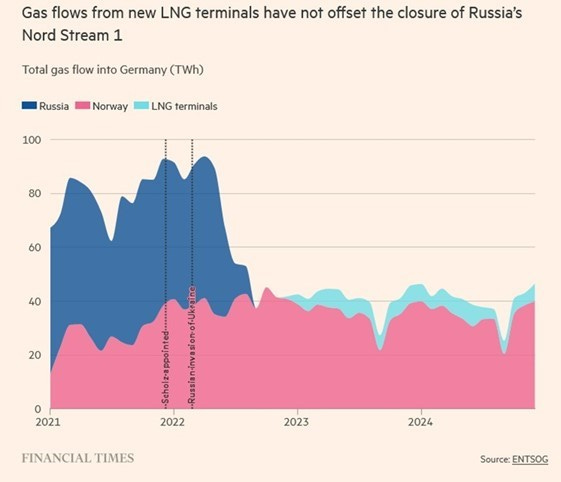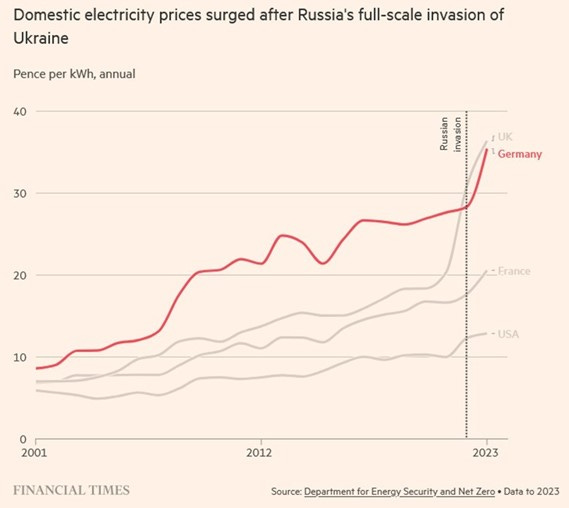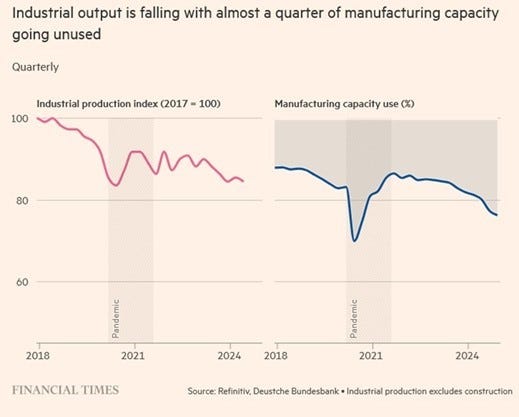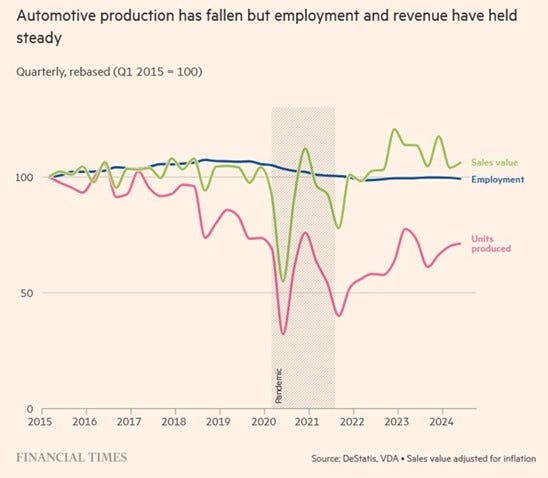Energy Musings - February 3, 2025
Former Chancellor Angela Merkel has written a memoir trying to burnish her reputation. Reviews have been devastating. Merkel cannot justify many of her energy policy actions.
Merkel’s Memoir Fails Amidst Germany’s Problems
Last November, former German Chancellor Angela Merkel published her autobiography, “Freedom,” to burnish her reputation. She was Germany’s first female chancellor, serving for four consecutive four-year terms from 2005 to 2021, during which she had a very high political profile. She also was the titular head of the European Union (EU) and its strongest economy.
Merkel was the second-longest serving German chancellor, missing out on the longest by 10 days. Her time in office covered numerous high profile geopolitical events such as the Great Financial Crisis of 2008-2009, the flooding of Europe by Muslim migrants, the growth of Islamist terrorism, Russia’s taking over Crimea, Brexit, Covid-19, the rise of China’s Xi Jinping, and the election of Donald Trump.
According to media reports, Merkel’s memoir was written to help restore her reputation, which has been beaten because of the economic and political fallout from many of her official acts and policies. The media says her effort is not working.
Merkel’s tenure at the top of the German government capped a fascinating career given her unique background. Three months after her birth in 1954 in West Germany, her family relocated to East Germany as her pastor father was offered a pastorate 56 miles from Berlin. She grew up in communist East Germany when the country was divided.
During part of the time Berlin was divided, East Germans could pass through security and visit West Berlin, which had amazing stores offering a wide array of consumer goods unavailable in East Germany. This feature was ultimately shut down by East Germany, which saw West Berlin as a beacon of freedom, and its benefits ultimately led to the popular revolt that saw the Berlin Wall torn down. Merkel commented on growing up in East Germany, saying, “Life in the GDR was sometimes almost comfortable in a certain way, because there were some things one simply couldn’t influence.”
After earning a doctorate in quantum chemistry in 1986, Merkel worked as a research scientist for three years before entering politics. She began as deputy spokeswoman for the first democratically elected government of East Germany. Following German reunification in 1990, Merkel was elected to the Bundestag (legislature). She became a protégée of Chancellor Helmut Kohl, who appointed her Minister for Women and Youth in 1991, and Minister for the Environment, Nature Conservation, and Nuclear Safety in 1994.
In the 1998 federal election, Merkel’s Christian Democrats (CDU) party lost. However, Merkel was elected general secretary of the party. She became her party’s first female leader and the first female leader of the Opposition in 2000. A coalition government led by the CDU was formed after the 2005 election, in which Merkel was elected chancellor. She was the first female chancellor, and Merkel was the first chancellor of the reunified Germany to have been raised in East Germany.
As Merkel’s CDU won the largest number of votes, it formed a coalition government with the Free Democratic Party (FDP), better than a grand coalition of three parties. In 2013, the CDU won a landside victory and partnered with the Social Democratic Party (SPD) to form a coalition government after the FDP lost all its political support. In the 2017 election, Merkel’s CDU became the largest political party for the fourth time, enabling it to partner with the SPD in governing Germany.
Merkel’s autobiography was written with her chief of staff, who was known to be “fiercely protective” of the chancellor. As detractors and supporters knew her, Mutti Merkel (“Mother Merkel”) wrote the 736-page memoir to secure her legacy, but it seems to be failing, judging by reviews. One reviewer suggested “Freedom” could be retitled “Boredom” for its “humdrum” style. The book offers her views of various political leaders and stories of interactions with them. However, her efforts to defend her energy policies interested us, but not enough to buy the book after reading multiple reviews.
Merkel was a champion of Germany’s use of cheap Russian natural gas. That low-cost energy source helped power the German economy, which is critical for the economic success of the EU. She writes, “I was accused more forcefully than ever of having led Germany into an irresponsible dependency on Russian gas,” after Russia invaded Ukraine. She tries to shift the blame for Nord Stream 1 to her predecessor, Gerhard Schrőder. However, the pipeline was constructed on her watch, and she approved the Nord Stream 2 contracts, which would have made Germany even more dependent on Russian energy.
In response to her decision to accelerate the shutting down of Germany’s nuclear power industry following the 2011 Fukushima nuclear plant accident, she notes that “natural gas served as a fossil-fuel bridge technology to reach climate targets until renewable energy was able to take over completely.” Her nuclear energy actions are being questioned for making Germany more dependent on Russian energy.
Germany’s efforts to power its economy on renewables have been a costly endeavor. At the same time, the loss of Russian gas contributed to higher electricity prices, decimating the German industrial economy. Moreover, the reduction in Germany’s carbon emissions has not exceeded that of the United States but has cost substantially more. Czech-Canadian scientist and policy analyst Vaclav Smil demonstrated that relationship in a paper studying the first 20 years of Germany’s Energiewende (decarbonization program).
Germany’s electricity fuel mix has changed with loss of nuclear power.
Germany relies more on expensive imported liquefied natural gas (LNG) without cheap Russian gas. Those supplies have not proven sufficient to replace the lost Nord Stream pipeline supplies. We also know Germany is a major consumer of Russian LNG that enters the continent through neighboring countries and is shipped to Germany.
Germany needs LNG from other locations to offset loss of Nord Stream 1.
The German economy is suffering because electricity prices are among the highest on the continent. While prices surged after Russia invaded Ukraine, they have steadily risen since 2001 and are substantially higher than electricity prices in France and the United States.
Germany’s electricity prices have been soaring.
The Financial Times notes that almost a quarter of Germany’s manufacturing capacity is going unused. The decline coincides with two years of recession in Germany. The 2025 forecast has cut Germany’s economic growth rate from 1.1% to 0.3%, putting the economy on the brink of a third recession year. Another year of weak economic activity will push the electorate to vote for different leadership in the upcoming election. Germany may be about to adopt significantly different economic, climate, and geopolitical policies.
Germany has 25% of its manufacturing capacity idle.
A major challenge for Germany is reviving its automobile industry, a significant economic force. The arrival of cheap Chinese electric vehicles (EV) has hurt the transition to EVs. Recent weakness in China’s automobile market has taken a toll on the German automakers with operations there. Now, Germany must contend with the possibility of tariffs on vehicle exports to the U.S., which would significantly impact Germany’s luxury auto sales.
Germany’s automobile output has fallen.
Volkswagen, Germany’s leading auto manufacturer, is struggling financially and planning to shut plants, lay off workers, and reduce the salaries of remaining workers. Each action would be a historic first for the company. The plan details are being negotiated with the auto unions after a threatened strike led to a postponement of the plan and an agreement to negotiate the details.
What is happening in Germany’s auto industry is being experienced in other export-dependent manufacturing sectors. The result is German unemployment is rising after years of steady decline. That is not a good sign for the economy’s future.
Germany’s unemployment is rising.
The ZEW Indicator of Economic Sentiment, which tracks German industry expectations for the next six months, dropped more than five points in January to 10.3, much lower than the forecasts for 15.0 reading. According to ZEW President Achim Wambach, “The second consecutive year of recession caused economic expectations in Germany to fall.” The prospect is growing for a third-year of recession, creating a significant drag on the economy.
German Economic Minister Robert Habeck told a recent press conference at the time of the 2025 GDP growth rate cut, “Germany is stuck in stagnation.” He attributed the problems to domestic political instability and the upcoming election. Additionally, the Trump tariffs overhang the outlook for Germany’s export-driven economy.
Leading business associations led protests in several German cities in response to the downgrade in the economic outlook. They said economic issues should be at the top of the next government’s agenda. This would include cutting red tape and taxes, devising a plan for more affordable energy, and increasing the pool of skilled labor. “Short-term crisis management will not help Germany…We need fundamental (structural) changes in economic and social policy,” they said.
While the CDU is leading in the polls, it is not projected to secure a majority. That will force difficult and possibly extensive negotiations to form a coalition government. Political uncertainty will continue to add to the pessimism in Germany’s economy.
CDU part leaders say the publicity surrounding Merkel’s autobiography is damaging their current election campaign. The next several weeks will be interesting and intense as we await the outcome of the February 23, 2025, election. Merkel’s standing in history is also at stake. In 2015, the Financial Times called Merkel “one of Germany’s great chancellors.” In response to her memoir, the paper called her “the most damaging European leader since 1943.” That is not the reputation Merkel wants, and her autobiography isn’t helping.




